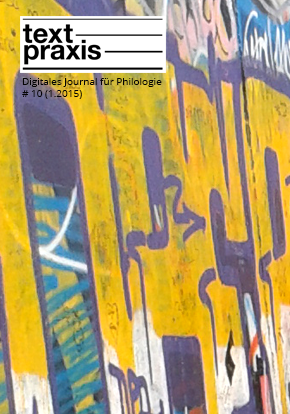Digital Journal for Philology

Textpraxis # 10 (1.2015)
In the tenth issue Mirjam Bitter analyses the German-Jewish dialogue in Bernhard Schlink’s Die Beschneidung, Theresa Schmidtke explores pop literature storytelling in writers’ blogs and Gerrit Lembke and Ingo Irsigler present their innovative project Vorlesung mal anders.
The article examines the possibilities and limits of pop literature storytelling in writers’ blogs. Through the example of Sven Regener’s blog projects (now published in book form under the title Logbücher. Meine Jahre mit Hamburg-Heiner) it investigates, how and how far two characteristics that are considered typical for pop literature, author staging and timeliness, have been adapted or renewed according to specific media. This article argues that Regener’s blogs indeed contain features of pop literature, which are implemented in them in an innovative way, specifically in the space of the Internet, but which still fall short from utilizing the many potentials of online-based storytelling.
Schlink’s novella depicts the failure of a German-Jewish dialogue through the private scenes of two lovers and explores the number of differences that a relationship can bear. The title, Die Beschneidung, on the one hand refers to the plot, since the German protagonist hopes to overcome his cultural differences with his Jewish-American girlfriend by converting to Judaism, which, for him, would involve circumcision. On the other hand, the literary text expounds the problem of circumcision on a metaphorical level by recounting how the protagonist ›cuts off‹ many topics, because he is afraid of being criticized for his thoughts by Jewish characters. As a victim of anti-German prejudices, he invokes several anti-Semitic stereotypes. This article explores how and if the novella sensitizes against such stereotypical thinking and thus subtly criticizes an anti-Semitic and revisionist discourse, or if, on the contrary, the text engrains itself in such a discourse.
Innovative research requires cutting-edge formats for mediating information that take place beyond traditional teaching. The Vorlesung mal anders / A different lecture for once, organized by Ingo Irsigler and Gerrit Lembke in Kiel, tries to give students an idea of what cultural studies are all about, but in a different way – ›mal anders‹. That is, a lecture without tests, attendance lists, or even credit points, but with young lecturers and numerous motivated students.
